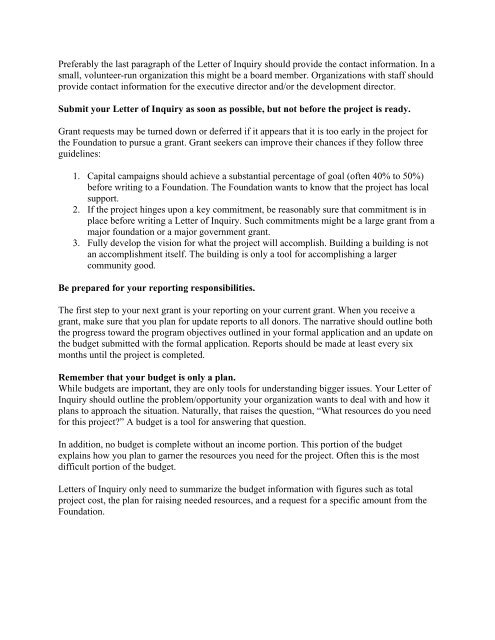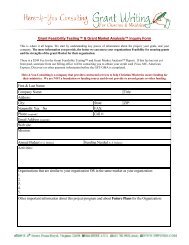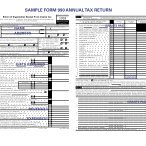Tips for Writing a Letter of Inquiry
Tips for Writing a Letter of Inquiry
Tips for Writing a Letter of Inquiry
Create successful ePaper yourself
Turn your PDF publications into a flip-book with our unique Google optimized e-Paper software.
Preferably the last paragraph <strong>of</strong> the <strong>Letter</strong> <strong>of</strong> <strong>Inquiry</strong> should provide the contact in<strong>for</strong>mation. In a<br />
small, volunteer-run organization this might be a board member. Organizations with staff should<br />
provide contact in<strong>for</strong>mation <strong>for</strong> the executive director and/or the development director.<br />
Submit your <strong>Letter</strong> <strong>of</strong> <strong>Inquiry</strong> as soon as possible, but not be<strong>for</strong>e the project is ready.<br />
Grant requests may be turned down or deferred if it appears that it is too early in the project <strong>for</strong><br />
the Foundation to pursue a grant. Grant seekers can improve their chances if they follow three<br />
guidelines:<br />
1. Capital campaigns should achieve a substantial percentage <strong>of</strong> goal (<strong>of</strong>ten 40% to 50%)<br />
be<strong>for</strong>e writing to a Foundation. The Foundation wants to know that the project has local<br />
support.<br />
2. If the project hinges upon a key commitment, be reasonably sure that commitment is in<br />
place be<strong>for</strong>e writing a <strong>Letter</strong> <strong>of</strong> <strong>Inquiry</strong>. Such commitments might be a large grant from a<br />
major foundation or a major government grant.<br />
3. Fully develop the vision <strong>for</strong> what the project will accomplish. Building a building is not<br />
an accomplishment itself. The building is only a tool <strong>for</strong> accomplishing a larger<br />
community good.<br />
Be prepared <strong>for</strong> your reporting responsibilities.<br />
The first step to your next grant is your reporting on your current grant. When you receive a<br />
grant, make sure that you plan <strong>for</strong> update reports to all donors. The narrative should outline both<br />
the progress toward the program objectives outlined in your <strong>for</strong>mal application and an update on<br />
the budget submitted with the <strong>for</strong>mal application. Reports should be made at least every six<br />
months until the project is completed.<br />
Remember that your budget is only a plan.<br />
While budgets are important, they are only tools <strong>for</strong> understanding bigger issues. Your <strong>Letter</strong> <strong>of</strong><br />
<strong>Inquiry</strong> should outline the problem/opportunity your organization wants to deal with and how it<br />
plans to approach the situation. Naturally, that raises the question, “What resources do you need<br />
<strong>for</strong> this project?” A budget is a tool <strong>for</strong> answering that question.<br />
In addition, no budget is complete without an income portion. This portion <strong>of</strong> the budget<br />
explains how you plan to garner the resources you need <strong>for</strong> the project. Often this is the most<br />
difficult portion <strong>of</strong> the budget.<br />
<strong>Letter</strong>s <strong>of</strong> <strong>Inquiry</strong> only need to summarize the budget in<strong>for</strong>mation with figures such as total<br />
project cost, the plan <strong>for</strong> raising needed resources, and a request <strong>for</strong> a specific amount from the<br />
Foundation.






